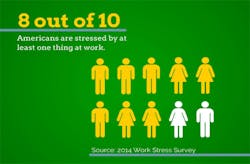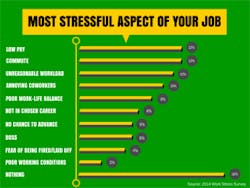‘Frazzled’ on the Job: More Than 80 Percent of American Workers Are Stressed Out
The third Annual Work Stress Survey conducted by Harris Interactive on behalf of Everest College found that more work and less pay are the top contributors to job stress in America, with 10 percent more workers claiming to be stressed out in 2013 than in 2012.
The U.S. unemployment rate may be falling, but stress levels continue to rise among workers as more than eight in 10 employed Americans said they are stressed out on the job amid heavier workloads and low pay.
“More companies are hiring, but workers are still weary and stressed out from years of a troubled economy that has brought about longer hours, layoffs and budget cuts,” said survey spokesman John Swartz, regional director of career services at Everest College. “Americans have plenty of reasons to be optimistic, but anxiety among employees is rooted into our working lives, and it is important to understand new and better ways of coping with the pressure.”
The telephone survey of 1,019 employed adults found that 83 percent of Americans are stressed by at least one thing at work. The survey was conducted to coincide with April's Stress Awareness Month, when health care professionals across the country join forces to increase public awareness about the causes and cures for the modern stress epidemic.
For the third consecutive year, paltry paychecks were a top stressor with 14 percent of adults ranking low wages as the most stressful aspect of work. Low pay shared the top spot with unreasonable workload, jumping to 14 percent from 9 percent in 2012. Annoying coworkers and commuting tied at 11 percent, followed by working in a job that is not a chosen career (8 percent), poor work-life balance (7 percent), lack of opportunity for advancement (6 percent) and fear of being fired or laid off (4 percent).
Eighteen percent of the survey participants with a high school diploma or less ranked low pay as the top stressor, followed by annoying coworkers (14 percent). College graduates ranked unreasonable workload No. 1 (17 percent), followed by their commute (12 percent).
Not surprisingly, income plays a significant role in determining the top workplace stressors. Those whose household income is less than $35,000 are more likely than those in the top income groups to say that their top stressors are low pay (26 percent), that their job is not in their chosen field (11 percent) and there are no opportunities for advancement (10 percent).
For these workers, Swartz recommends “going back to school to receive the necessary education to find a new career that will make you happier and, hopefully, less stressed.”
The highest earners, however (those with a household income of $100,000 or more), are more likely than the lowest earners to cite unreasonable workload (16 percent) and their commute to and from work (16 percent) as their top workplace stressors. Higher wage earners are also twice as likely as those in the lowest income bracket to say that nothing about their job stresses them out (18 percent vs. 9 percent).
Eighty-six percent of respondents in the Northeast said something in the workplace stresses them out, compared with 75 percent in the West. Low pay was the No. 1 reason for stress in the Northeast (17 percent).
“In many ways, the workplace is much different than it was a decade ago and a growing number of Americans are not just sitting back. They're stepping up and taking charge of their careers,” Swartz said. “There are many reasons for feeling stressed at work, but those who feel like they've been able to have control over their careers and work in a field they're truly passionate about, end up being more satisfied and productive.”
About the Author

Sandy Smith
Sandy Smith is the former content director of EHS Today, and is currently the EHSQ content & community lead at Intelex Technologies Inc. She has written about occupational safety and health and environmental issues since 1990.

